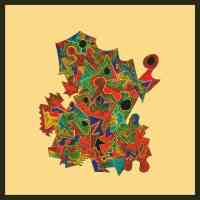

Thandi Ntuli
 Thandi Ntuli begins Rainbow Revisited with a zen-like, blurred chant to the sunrise in California. She sings later of the California sunset. She pays tribute to her ancestors on "Nomayoyo,” laments the rainbow that never fully formed in South Africa, performs experiments in breath, synth and voice, sings of “The One” and ends with “Lihlanzekile,” a Zulu word that means ‘It has been cleansed.' It is an album that fits together like the puzzle pieces artist Shabaka Hutchings created for the cover art.
Thandi Ntuli begins Rainbow Revisited with a zen-like, blurred chant to the sunrise in California. She sings later of the California sunset. She pays tribute to her ancestors on "Nomayoyo,” laments the rainbow that never fully formed in South Africa, performs experiments in breath, synth and voice, sings of “The One” and ends with “Lihlanzekile,” a Zulu word that means ‘It has been cleansed.' It is an album that fits together like the puzzle pieces artist Shabaka Hutchings created for the cover art.
And so, on a Venice Beach afternoon, Ntuli created an intimate and political album, with some percussion and light production from LA multi-instrumentalist Carlos Niño. The inventiveness of this music is in part due with the sweetness of the vocals, offset by tight parenthetical ideas on the piano. It touches on the avant garde with warmth. These in-between spaces are so lovely and compelling, layered to make it feel familiar and yet strange, much the way Thelonious Monk deconstructed a jazz standard. The sound is intimate and personal, as if you hear her muse and her private thoughts. These chants over time slowly become yours, repeating freely in your subconscious. Slowly the realization blooms that there are ancient truths buried here. The largely wordless album has a story to tell. It is an evening lullaby, a ritual by a dim light before sleep overtakes you. One might be tempted to define these compositions as a new direction in jazz. but it is perhaps more accurate to say that one hears the evolution of jazz joyously exploding from its boundaries. This is an album of piano, voice, body sounds, cymbals and percussion, sounds so rich, so orchestral that it stands in contrast to so much of the over produced music of this century. You might think of Miles Davis and that intimate trumpet, always on its own path, or of Thelonious Monk and his chunky discordant handling of the piano. All of this lives in the layers of Rainbow Revisited. You will also think of the blues. The minute the blurred music begins on “Sunrise (in California),” the first thought that emerges is an old Folkways recording of Lead Belly singing “Moanin.” Thandi Ntuli sings in a joyous moan. As August Wilson wrote in Ma Rainey’s Black Bottom, the blues is “life's way of talking. You don't sing to feel better. You sing 'cause that's a way of understanding life.” Ntuli was born to a musical family in Pretoria and is the youngest of five children. She is a classical piano prodigy who attended the University of Cape Town rather than accepting a Berklee scholarship. Her playing has little bits of Monk or Keith Jarrett, but more in the sense of how she molds a tune by taking it in different directions. She plays riffs of repetitive rhythm cycles akin to Phillip Glass but with a sound that breaks down the genre walls that constrain improvisation. These songs deserve deep, meditative listening and a glance or two at your own soul. Ntuli's scatting on the album sometimes sounds like a far off voice, adding a sort of moral authority to the music. She is conjuring the idea of the Rainbow Nation as envisioned by Desmond Tutu and Nelson Mandela.
On the title track Ntuli chants “Rainbow, Rainbow, Rainbow, Rainbow, Rainbow, Rainbow,” a bare reworking of “Rainbow (Skit),” from her album Exiled. Moaning, yes - or perhaps instead a long-held yearning for an unkept promise. It is a lovely, sacred piece, almost liturgical in its sensibility. The original lyrics include: They talk of freedom, what do they know? In the background of all these songs there is a sound that is familiar in South African music. Abdullah Ibrahim is the obvious forefather here. Ntuli has mentioned her affinity with Malian music and particularly Oumou Sangare. It is these influences that form the album into sounds that are avant garde in the sense of being unexpected labyrinths of ideas, but they are on a familiar path that is both comforting and engrossing.
“Nomoyayo (Ingoma ka Mkhulu)” was written by her grandfather, and was often sung at family gatherings. It is about a young boy being awakened by a thief entering the house. It is in the same vein as "Abiyoyo,” a Bantu lullaby about a giant who would come down and abduct naughty children. “Nomoyayo” sounds like South African comfort food, a gentle lullaby as a tribute to her grandfather and to her family. Ntuli’s grandfather was a choral composer, and her uncle was South African pop aristocracy - Selby Ntuli of the Beaters/Harari.
The stand out on this album is "The One," an eight-minute suite in two parts with a magical litany of sounds that come tripping out as ideas form. It sounds completely improvised and is exquisite, simple, delicate jazz. Rainbow Revisited is a rare gift from a talented artist.
Search RootsWorld
|